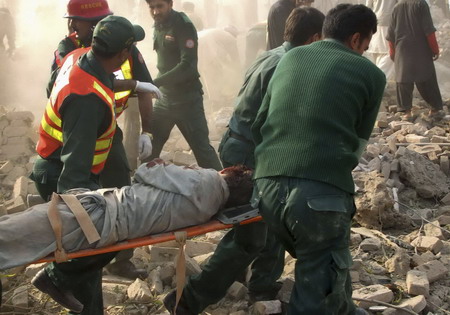Blast kills 33 near lawmaker's home in Pakistan
A suicide attacker detonated a car bomb in a market close to a politician's home in central Pakistan, killing 33 people and showing the increasing reach of Taliban militants in the nuclear-armed nation.
 |
|
Rescue workers remove a body from the site of a car bomb attack in the Pakistani town of Dera Ghazi Khan December 15, 2009. [Chinadaily.com.cn via agencies] |
The blast Tuesday came shortly before the top-ranked US military officer arrived in the Pakistani capital for previously scheduled talks with the country's powerful army chief about the ongoing military offensive against the militants in the northwestern region near the Afghan border.
The insurgents, who are linked to al-Qaida and militants fighting US and NATO troops in neighboring Afghanistan, want to topple the US-allied government in Pakistan and install a hard-line Islamist regime.
Under heavy Western pressure, the Pakistani army launched an offensive against the Taliban's main stronghold of South Waziristan in October. The militants have retaliated with an onslaught of bombings that have killed more than 500 people, most of them civilians.
Tuesday's attack in the Punjabi town of Dera Ghazi Khan badly damaged the lawmaker's house and nearby shops and buildings, including a mosque and bank. It was unclear whether the bomber was targeting the home of the politician, who was not there at the time, or the market.
The dead and most of the injured were people shopping or working at the market.
As night fell, people searched through the debris for survivors trapped under the rubble.
"The whole market has collapsed," said Raza Khan, a local resident. "There is smoke and people running here and there."
Rescue official Natiq Hayat said 33 people were killed and 60 wounded. Government official Hasan Iqbal said the attack was carried out by a suicide bomber.
The attacker had packed the car with about 900 pounds (400 kilograms) of explosives, senior police officer Mohammad Rizwan said.
The lawmaker whose home was hit, Zulfiqar Khosa, is a senior member of the Pakistan Muslim League-N party, which is in charge of the Punjab government but is in the opposition in the federal government.
The militants have staged several attacks in Punjab, far beyond the northwestern tribal regions bordering Afghanistan. Dera Ghazi Khan district is in Punjab but borders the country's other three provinces.
Zulfiqar Khosa's son, Dost Mohammad Khosa, said two of his cousins were among the wounded.
"It was a direct attack on us," Dost Mohammad Khosa alleged, declining to speculate who was behind the blast.
Iqbal said he doubted the house was the target, speculating that the attacker simply wanted to spread terror in the town.
Militants have mostly targeted security forces in recent months, but lawmakers and court buildings also have been attacked. There have also been at least three bombs in crowded markets, apparently aimed at causing civilian casualties and undercutting public support for the army offensive.
Later Tuesday, Adm. Mike Mullen, chairman of the US Joint Chiefs of Staff, praised Pakistan's military campaign in South Waziristan, but he said ahead of his visit that he would take up concerns about what he called increasingly close collusion between militants and terrorists on both sides of the Pakistan-Afghanistan border.
Mullen has built an unusually close bond with Pakistani Army chief Gen. Ashfaq Parvez Kayani. Tuesday night's meeting in Islamabad is the 14th the men have held.
Mullen is the latest top US official to visit Pakistan in recent weeks to discuss President Barack Obama's decision to send an additional 30,000 US forces to the flagging war in Afghanistan, and to apply pressure on Pakistan to scour the forbidding border for militant havens.
 0 Comments
0 Comments






